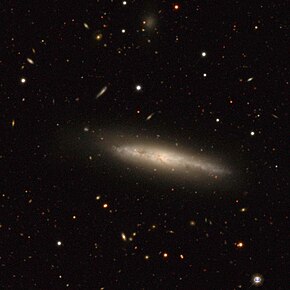| NGC 1484 | |
|---|---|
 NGC 1484 (
legacy surveys) | |
| Observation data ( J2000 epoch) | |
| Constellation | Fornax |
| Right ascension | 03h 54.2m [1] |
| Declination | −36° 58′ [1] |
| Redshift | 1035 km/s |
| Distance | 14.7 Mpc (47.9 Mly) |
| Apparent magnitude (V) | 13.1 [1] |
| Characteristics | |
| Type | SB(s)b: [2] |
| Apparent size (V) | 2.5′ × 0.6′ [1] |
| Other designations | |
| ESO 359-6, IRAS 03524-3706, MCG -6-9-36, PGC 14071 [2] | |
NGC 1484 is a barred spiral galaxy in the constellation Eridanus, 48 million light-years from Earth. It is part of the Fornax Cluster, that contains approximately 200 galaxies, making it the second richest galaxy cluster in 100 million light-years after the Virgo Cluster.
It was discovered by William Herschel on November 28, 1837. [3] Its distance and size on the night sky convert to an actual size of 35,000 light years, only a third or one-quarter the size of the Milky Way Galaxy.
- NGC 1399, central galaxy of the Fornax Cluster
- NGC 1531 and NGC 1532, pair of nearby Fornax Cluster galaxies
- NGC 1365
- NGC 1316
- ^ a b c d Dunlop, Storm (2005). Atlas of the Night Sky. Collins. ISBN 978-0-00-717223-8.
- ^ a b "Results for object NGC 1484 (NGC 1484)". NASA/IPAC Extragalactic Database. California Institute of Technology. Retrieved 2021-06-07.
- ^ Seligman, Courtney. "New General Catalogue objects: NGC 1450 - 1499". cseligman.com. Retrieved 2021-06-07.
| NGC 1484 | |
|---|---|
 NGC 1484 (
legacy surveys) | |
| Observation data ( J2000 epoch) | |
| Constellation | Fornax |
| Right ascension | 03h 54.2m [1] |
| Declination | −36° 58′ [1] |
| Redshift | 1035 km/s |
| Distance | 14.7 Mpc (47.9 Mly) |
| Apparent magnitude (V) | 13.1 [1] |
| Characteristics | |
| Type | SB(s)b: [2] |
| Apparent size (V) | 2.5′ × 0.6′ [1] |
| Other designations | |
| ESO 359-6, IRAS 03524-3706, MCG -6-9-36, PGC 14071 [2] | |
NGC 1484 is a barred spiral galaxy in the constellation Eridanus, 48 million light-years from Earth. It is part of the Fornax Cluster, that contains approximately 200 galaxies, making it the second richest galaxy cluster in 100 million light-years after the Virgo Cluster.
It was discovered by William Herschel on November 28, 1837. [3] Its distance and size on the night sky convert to an actual size of 35,000 light years, only a third or one-quarter the size of the Milky Way Galaxy.
- NGC 1399, central galaxy of the Fornax Cluster
- NGC 1531 and NGC 1532, pair of nearby Fornax Cluster galaxies
- NGC 1365
- NGC 1316
- ^ a b c d Dunlop, Storm (2005). Atlas of the Night Sky. Collins. ISBN 978-0-00-717223-8.
- ^ a b "Results for object NGC 1484 (NGC 1484)". NASA/IPAC Extragalactic Database. California Institute of Technology. Retrieved 2021-06-07.
- ^ Seligman, Courtney. "New General Catalogue objects: NGC 1450 - 1499". cseligman.com. Retrieved 2021-06-07.